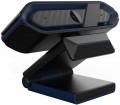Megapixels
The number of megapixels in the matrix that the camera is equipped with, in other words, the native resolution of the matrix. First of all, the maximum photo size directly depends on this indicator: for example, a 1600x1200 frame requires at least 1600 * 1200 = 1,920,000 pixels ≈ 2 MP. With video, the situation is somewhat different, where the actual resolution of the matrix can be noticeably higher than required for the frame.
There is an opinion that the more megapixels, the better the image is obtained. Formally, this is not the case: the resolution of the sensor only affects the detail, and in itself numerous megapixels can even worsen the picture — especially if the matrix is small. However, in fact, high-resolution sensors are often installed in fairly advanced cameras, in which high image quality is achieved through a number of characteristics.
HD filming (720p)
Historically the first of the high definition
HD (720p) standards. Initially, it assumed a resolution of 1280x720, however, in webcams, models with a different frame size are also included in this format — in particular, 960x720 and 1280x960, which have a 4:3 aspect ratio of the frame (unlike the original 1280x720, for which it is 16:9 ). Anyway, HD-models are relatively inexpensive and not particularly demanding on the quality of communication, however, they allow you to get a fairly detailed “picture”.
Full HD filming (1080p)
Further, after HD 720p, the development of high definition standards. Provides a standard frame size of 1920x1080; in addition, this category includes webcams that support 1600x1200 video — this resolution does not formally apply to
Full HD (1080p), but is comparable to it in detail. Anyway, cameras of this standard are quite advanced — in particular, they already allow showing documents and other objects with small details in the frame.
Quad HD filming
A kind of intermediate option between Full HD and UltraHD 4K: it noticeably surpasses the first standard in terms of detail, while being cheaper than the second and not so demanding on communication speed. The
Quad HD format does not have a strictly defined resolution, among webcams there are, in particular, 2048x1536 and 2592x1944.
Field of view
The viewing angle determines, first of all, how wide the field of view of the camera is, what area of the scene being shot falls into the frame. Accordingly,
a wide viewing angle allows you to capture more space and the lower the likelihood that something of what is happening will be behind the scenes. On the other hand, it should be taken into account that a strong increase in viewing angles leads to distortions of the “picture”, especially at the edges, as well as to a decrease in the size of visible objects and a decrease in detail.
File format
File formats in which the camera can save video footage.
This parameter is for reference only: modern computers are equipped with extensive sets of codecs that allow you to play almost all common formats, and in extreme cases, the missing codec can be installed separately. TVs in this regard have more limited capabilities, however, in webcams designed for them (see "Purpose"), this moment is initially taken into account.
Indicators
Types of indicators (usually light) provided in the design of the camera. In modern models, there are (separately or together) two types of indicators:
— Nutrition. An indicator that indicates that everything is in order with the power supply. On some models, this indicator only works when the camera is turned on and ready to use, on others it can also work in standby mode — for example, it will glow in a different light than when the camera is on.
— Activities. An indicator that indicates that the camera is shooting video — and, accordingly, it is being recorded or broadcast on the Internet. Such an indicator makes it easier to keep track of the shooting mode and avoids unpleasant situations, such as accidentally broadcasting to the Internet from a camera that you forgot to turn off.
PC connection
Ways to connect a webcam to a computer.
–
USB-A. A camera connection option that involves transmitting video and audio via a classic full-size USB-A connector. Note that such ports may belong to different versions (2.0, 3.2 gen1, 3.2 gen2), but they are quite compatible with each other. The higher the USB version, the faster the data is transferred, which provides an excellent quality picture in high frame resolution.
–
USB type C. A noticeable advantage of USB type C over the classic USB-A connector is its double-sided design, which allows you to connect the plug to either side. In addition, this connector usually uses a USB 3.1 gen1 or 3.1 gen2 connection, thereby providing high data transfer speeds. This is important when conducting video conferences in Full HD resolutions and higher.
— USB + Mini-jack 3.5. In this option, a connection via a USB port is used to transmit the video stream from the webcam, and a 3.5 mm audio jack (a round socket with a diameter of 3.5 mm, also called Mini-jack) is used to transmit audio.
– HDMI. A universal, comprehensive interface for transmitting high-resolution video and multi-channel audio in digital format from a webcam. Data exchange is carried out over a single cable, which simplifies connecting the camera to a computer.
Cable in box
Detachable cable design provides additional options for connecting a WEB-camera: the bundled cord can be changed to a longer or shorter one. Also
, the detachable cable is very convenient for storage and transportation.
The built-in cable is always in place - you can lose it only with the WEB-camera itself. On the other hand, a fixed wire cannot be quickly replaced with another one (for example, a longer one); and if it is damaged, you will have to carry the WEB-camera for repair or change it entirely.

